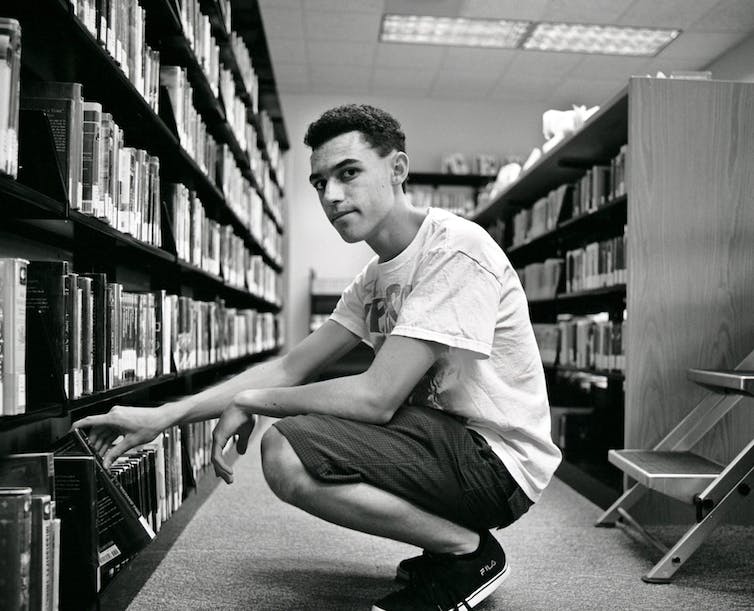‘I was putting like 20 resumes in a month’: research tracks young Australians’ precarious work and study lives after Year 12

Alexis Brown/Unsplash
New research released today by The Smith Family shows how leaving school can be a difficult and complex time for young people from disadvantaged backgrounds. It also shows how COVID has made this more difficult and complex.
The new report includes a survey of more than 1,000 young people who were in Year 12 in late 2020 and 33 interviews with some of these survey respondents. The same group was surveyed in 2021.
This research looks at what has happened since the group left school two years ago. It looks at whether they are working or studying, and what is influencing their choices and pathways after school.
The good news
The good news is more young people from low income families are working or studying after they have left school, up from 77% in 2021 to 85% in 2022.
Only 3% were not working, studying, doing unpaid work, volunteering or looking for work in 2022, compared to 5% in 2021.
But 10% of the group did not complete year 12 – echoing a national decline in the number of young people who are not finishing school.
In recent years, school retention rates have reached record lows.
Read more:
20% of Australian students don’t finish high school: non-mainstream schools have a lot to teach us about helping kids stay
COVID’s impact
But the study also found some interviewees were pulling out of study and training because they can’t afford it. As Kim* explained:
You pretty much have assignments back-to-back, and you’ve got placement as well […]. So you’ve got to think, ‘can I go that long without working for an income?’
This mirrors a wider trend, where students (of all ages) from fields such as teaching, social work and nursing, say they need income support while doing compulsory unpaid work placements.
COVID lockdowns also disrupted young people’s plans and made it difficult for them to restart. One interviewee, Peter, said:
I needed a specific amount of placement to be able to get my Cert II. And, you know with COVID […] I couldn’t actually get my hours […] And I moved on […] it’s not really a goal anymore.

Unpaid work placements make it very difficult for students to keep earning vital income.
Adam Winger/Unsplash
Read more:
‘We can no longer justify unpaid labour’: why uni students need to be paid for work placements
Precarious work
The study also shows young people from disadvantaged backgrounds working in precarious part-time, low-level jobs (if they can find work at all). As Mercedes told the researchers:
I wasn’t getting paid properly. I was chasing my pay all the time.
Peter also spoke of the difficulty of finding work:
I was putting like 20 resumes in a month. No one answered me […]
Of those in work, 14% were working two or more jobs, 37% wanted to work more hours, and 34% had looked for a new job in the past four weeks. The most common jobs were in retail and sales, labouring and other construction, transport, distribution and warehouse roles, and hospitality.
A complex web of factors explains these trends.

Of those surveyed, about one third of those who were already working had looked for a new job recently.
Kenny Eliason/Unsplash
More recently, pandemic lockdowns and school closures have affected the mental health of young Australians, which in turn has seen less school participation and Year 12 completion.
This has made it harder for young people to get and maintain job and follow studies after school. Of those surveyed, 30% said they had poor mental health. Of this group, 46% said it “often” or “always” had an impact on things other young people want to do.
But even before the pandemic, many public schools did not have enough resources to support senior students from disadvantaged backgrounds into employment. This is a missed opportunity and shows how, thanks to funding scarcity, government schools can end up inadvertently reproducing disadvantage.
There have long been calls to overhaul careers education. And the need for this has only become more acute, due to the pressures of COVID and declining student mental health.
In the longer-term, the job market has changed and this has disproportionately affected young people. While there is high demand for retail work, the emphasis is on skilled occupations.
During the past year, 60% of total employment growth has been in occupations that require a vocational qualification, compared to 36% in professions requiring a university degree. Meanwhile, vocational education and training continues to be in disarray and in needs of more funds and focus.
Read more:
‘Thinking about my future is really scary’ – school leavers are not getting the careers support they need
Governments have lots of opportunities now to listen
The Smith Family’s findings come at a time when governments and policy makers are looking closely at how training, employment and education work in Australia.
A federal Parliament inquiry is currently looking the status of vocational education and training, while the Treasury’s employment white paper, due in September, is looking at how all Australians can enjoy full employment.
The Universities Accord review is also looking at making higher education more accessible to people from disadvantaged backgrounds.
The Smith Family research shows once again how young people from disadvantaged backgrounds need additional support both at school and once they leave.
The continued impact of the pandemic, together with the rising cost-of-living, show how governments need to be very mindful of how they are supporting a whole generation as they navigate their way into post-school life.
*names have been changed.
Read more:
These 5 equity ideas should be at the heart of the Universities Accord
![]()
Lucas Walsh currently receives funding from The Paul Ramsay Foundation and the Australian Research Council. He has worked with The Smith Family and sits in a voluntary capacity on the Growing Careers Project External Reference Group. He was not involved in the creation of the report discussed in this article







